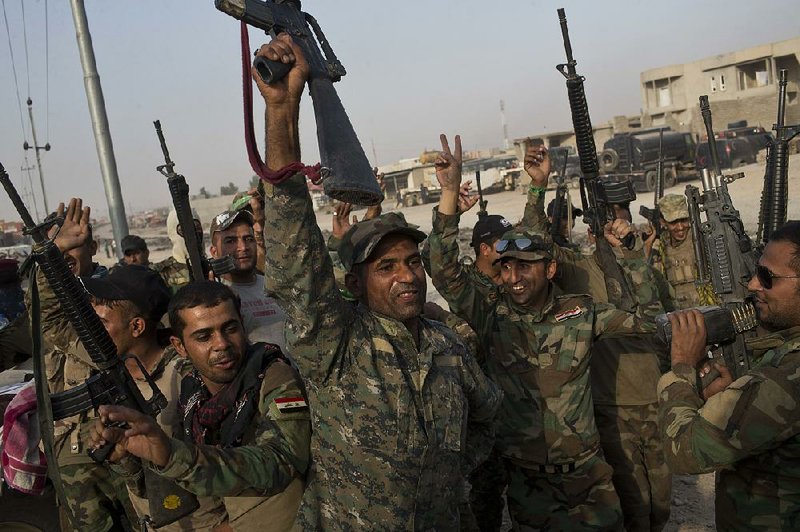KHAZER, Iraq -- A senior Iraqi general on Wednesday called on Iraqis fighting for the Islamic State extremist group in Mosul to surrender as a wide-scale operation to retake the militant-held city entered its third day.
The militants have put up fierce resistance in villages surrounding the city, where most of the fighting has been concentrated. The Islamic State group has sent trucks loaded with explosives careening toward the front lines and fired mortar rounds to slow the Iraqi forces' advance.
Lt. Gen. Talib Shaghati told reporters at a military base that up to 6,000 Islamic State fighters are inside the city. He did not say how many of them are foreigners.
The Islamic State militants captured Mosul, Iraq's second-largest city, in a lightning advance in the summer of 2014. The extremist group has suffered a string of defeats over the past year, and Mosul is its last major urban bastion in Iraq.
An Iraqi officer from the 9th Division said his troops were now about a half mile from Hamdaniyah, a historically Christian town also known as Bakhdida, to the east of Mosul.
Over the past day, the Islamic State militants sent 12 car bombs, all of which were blown up before reaching their targets, he said, adding that Iraqi troops suffered a small number of casualties from the mortar rounds. The officer, who spoke on condition of anonymity because he was not authorized to talk to reporters, did not provide specific figures.
To the north, airstrikes pounded Bashiqa as Kurdish forces fired mortar rounds from an area overlooking the Islamic State-held town.
Save the Children said 5,000 people have fled to a refugee camp in northeastern Syria from the Mosul area in the past 10 days, with another 1,000 waiting to enter at the border.
The group said the overwhelmed camp is "littered with waste and feces, with a looming risk of outbreaks of disease." It said there are just 16 latrines shared by more than 9,000 people, many of whom have access only to dirty, untreated water.
"Conditions there are among the worst we've seen, and we expect thousands more people to be on their way soon," said Tarik Kadir, head of the group's Mosul response.
The United Nations believes up to 1.5 million people in Mosul will be at great risk of being targeted, caught in crossfire, forcibly expelled or used as human shields.
U.N. humanitarian chief Stephen O'Brien told the U.N. Security Council that no large-scale displacement of civilians has been reported since the operation began.
But he said the U.N. anticipates "a displacement wave of some 200,000 people over the coming weeks, with up to 1 million displaced in the course of the operation in a worst-case scenario."
The operation to retake Mosul is the largest such action by the Iraqi army since the 2003 U.S.-led invasion. Some 25,000 troops, including Sunni tribal fighters, Kurdish forces known as the peshmerga and state-sanctioned Shiite militias known as the Popular Mobilization Units are approaching the city from different directions.
The U.S.-led coalition is providing airstrikes in support of the operation, and more than 100 U.S. soldiers are embedded with Iraqi forces, with hundreds more serving in a support role.
Maj. Gen. Gary Volesky, the top commander of U.S. land forces in Iraq, said U.S. Army Apache attack helicopters are striking the Islamic State targets in support of the operation.
The chief of the Russian military's General Staff said it has been monitoring the Mosul operation and is concerned that militants might escape to Syria. "Despite all the uproar on Western TV channels, the operation hasn't started in earnest yet," Gen. Valery Gerasimov said.
He said the Russian military is using aerial assets to monitor for "possible attempts by the militants to break out of Mosul or leave the city for Syria unimpeded."
Russian warplanes in neighboring Syria have been carrying out airstrikes for more than a year in support of Syrian President Bashar Assad's forces.
The commander of U.S. forces in the Middle East predicted Wednesday that the fight for Mosul could take months and is likely to feature periods of fierce combat.
Army Gen. Joseph Votel, commander of U.S. Central Command, said the duration of the battle will be determined in part by how Islamic State fighters react and adjust to the unfolding Iraqi offensive. He noted that the extremist group has had more than two years to prepare its defenses in and around city.
Speaking at the Center for American Progress, a Washington think tank, Votel said Iraqi officials have spoken publicly of the Mosul battle lasting for weeks or months. He said he is comfortable with the Iraqis' time frame and said it was important to credit the Islamic State with being an adaptive enemy capable of adjusting to setbacks.
"I'll give you an example," he said. "The operation we did to Manbij, in northern Syria, took about 71 days to complete, from start to finish." That was completed in August. Votel noted that another key objective in Syria -- Raqqa, the self-proclaimed Islamic State capital -- is about three times the size of Manbij.
"Mosul is about three times the size of Raqqa," he said, suggesting that Mosul could be orders of magnitude harder than either Manbij or Raqqa. There had been speculation that offensives to retake Raqqa and Mosul might happen simultaneously.
Information for this article was contributed by Sinan Salaheddin, Joseph Krauss, Edith M. Lederer, Robert Burns and Vladimir Isachenkov, Robert Burns, Vivian Salama and staff members of The Associated Press.
A Section on 10/20/2016

